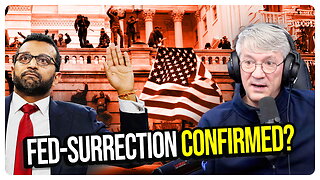Premium Only Content

'An Expensive Place to Die' (1967) by Len Deighton
Len Deighton’s, 'An Expensive Place to Die' (1967) marks a crucial turn in the evolution of the spy novel—not just in its form or politics, but in its aesthetic. Set largely in Paris, this fifth novel featuring Deighton’s nameless British intelligence officer departs from the relatively structured procedural intrigue of earlier works like The IPCRESS File and Funeral in Berlin to explore a more ambiguous, shadowy world of moral disintegration, psychological manipulation, and bureaucratic decay. In doing so, it anticipates the gloomier tone of John le Carré’s Cold War fiction, while still bearing Deighton’s own satirical fingerprints.
A European Noir of the Cold War: The story centers around a Parisian clinic run by the sinister Dr. Schlegel, whose patients are subjected to strange psychological treatments—treatments that often resemble interrogations. Our narrator is sent to investigate what appears to be a minor intelligence concern, but quickly finds himself drawn into a web of competing loyalties, sexual intrigue, and blackmail. Among the figures populating this murky world are Lopex, a Latin American agent with unclear allegiances; Maria, a femme fatale with a past; and an array of characters who are only half-real, like shadow puppets playing roles in a badly written melodrama.
Paris is not just the backdrop here; it is the atmosphere, the texture, the moral and emotional temperature of the novel. Deighton’s Paris is not the city of lights or lovers—it is a city of quiet conspiracies and gray rain, of anonymous buildings and clandestine transactions, where diplomacy and espionage are indistinguishable from criminal enterprise. The title itself is ironic: 'An Expensive Place to Die' is not a lament for the price of living, but a mordant commentary on the price of political gamesmanship.
Narrative Technique and Structural Experimentation
This is also the most formally experimental of Deighton’s early spy novels. It opens with an enigmatic report from “D.A. Chapter 11” and incorporates files, transcripts, and ambiguous letters, all of which blur the line between narrative and evidence. In places, the novel reads like a dossier or classified report, lending it an almost postmodern flavor. This fragmentation enhances the central theme of distrust—not just of institutions or adversaries, but of language, identity, and memory.
Deighton forces the reader to question every statement, to wonder if characters mean what they say, or know what they mean. There is no omniscient narrator to guide us; instead, there is only the weary, ironic voice of the unnamed protagonist—at once sardonic and vulnerable, competent and powerless.
Themes: Power, Sexuality, and Surveillance: 'An Expensive Place to Die' deals explicitly with themes that Deighton had only hinted at previously—particularly sexual politics and the commodification of intimacy. The novel is suffused with a sense of voyeurism, where sex is not an act of passion but a tool of coercion, surveillance, and blackmail. Dr. Schlegel’s clinic is both a metaphor and a literal site of exploitation: a place where bodies are laid bare and identities are reconstructed under the guise of therapy.
What separates this novel from typical Cold War fare is its grim insistence that there are no heroes—only bureaucrats in trench coats, playing chess with human lives. The intelligence services, far from being paragons of patriotism, are shown to be squalid, compromised, and often indifferent to the suffering they cause. This bleakness is not accidental but thematic: Deighton is writing about a world in which ideology has collapsed, replaced by careerism, paranoia, and transactional loyalty.
Comparison with Contemporaries: While Ian Fleming was still turning out his escapist fantasies and John le Carré was refining his critique of espionage ethics, Deighton carved out a space in between. His unnamed spy is not as self-destructive as Le Carré’s Alec Leamas or as emotionally raw as George Smiley, but he operates in a similar environment of bureaucratic mistrust and moral fatigue. At the same time, Deighton maintains a sense of pace and irony that keeps the narrative engaging, even when it borders on nihilism.
Final Thoughts: 'An Expensive Place to Die' is not an easy novel. It offers little in the way of resolution or emotional catharsis. It is cold, cerebral, and often difficult to follow—by design. But it is also one of Deighton’s most ambitious works: a bleak, formally inventive meditation on the human cost of intelligence work, delivered in sparse, bitter prose. It does not seduce the reader with glamor or action; instead, it disorients, unsettles, and forces one to ask: what exactly is being won in the Cold War, and at what price?
In the end, this novel lives up to its title—not because anyone dies dramatically in Paris, but because something else does: belief, clarity, perhaps even the soul of espionage fiction itself.
-
 1:15:20
1:15:20
vivafrei
3 hours agoLive with The Blaze's Steve Baker: Jan. 6 Fed-Surrection and Patel's Clarification Adds Confusion!
80K14 -
 LIVE
LIVE
Dr Disrespect
5 hours ago🔴LIVE - DR DISRESPECT - BABY STEPS - TO THE TIPPITY TOP
1,902 watching -
 LIVE
LIVE
Futures Edge: Finance Unfiltered with Jim Iuorio and Bob Iaccino
1 hour agoSeptember Surge: What It Means for Q4
153 watching -
 1:41:57
1:41:57
The Quartering
2 hours agoMotive In Church Attack Revealed, Dangerous Walmart Food Kills, Eric Adams Out & More
105K20 -
 LIVE
LIVE
The Trish Regan Show
1 hour agoBREAKING: NFL Picks Anti-Trump Rapper Bad Bunny for Super Bowl—Risking MASSIVE Fan Boycott!
363 watching -
 45:18
45:18
Stephen Gardner
2 hours ago🚨EXPOSED: Real reason Trump preparing for war - Tulsi Gabbard WARNS Trump!!
4.07K26 -
 4:23:04
4:23:04
Right Side Broadcasting Network
7 hours agoLIVE REPLAY: President Trump Participates in a Press Conference With Prime Minister Netanyahu - 9/29/25
91.6K37 -
 1:09:19
1:09:19
The White House
5 hours agoPresident Trump Participates in a Bilateral Meeting with the Prime Minister of the State of Israel
26.2K30 -
 1:25:35
1:25:35
Russell Brand
4 hours agoMichigan Church Shooting Sparks Trump Warning Of ‘TARGETED ATTACK On Christians’ - SF641
170K45 -
 1:59:24
1:59:24
The Charlie Kirk Show
4 hours agoRemembering Charlie's Martyrdom and Continuing His Revival | Driscoll, McPherson | 9.29.2025
172K47